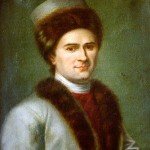 Jean-Jacques Rousseau (1712-1778) was a Swiss philosopher and a pivotal figure of the European Enlightenment. The French Revolution was shaped more by Rousseau’s ideas than by the works of any other figure. Rousseau was born in Geneva, where he was raised and educated by his father, a skilled clockmaker. After a number of different jobs and failed apprenticeships, Rousseau moved to Paris at age 30, taking up employment as a government official while studying political philosophy in his spare time. He made several contributions to Denis Diderot‘s Encyclopédia and in 1750 won a major essay competition, after which he returned to Geneva and began writing in earnest. In 1762 Rousseau published two of his best known books: The Social Contract and Emile. The first of these was a discourse on the relationship between government and individuals, which contained the immortal line “Man is born free yet everywhere he is in chains”. Emile continued on the same theme but also considered how individuals should be educated to become better citizens. These works thrust Rousseau into the public arena – but his strong criticisms of royalty, aristocracy and religion also saw him hounded out of Geneva. He returned to France, where he lived out the remainder of his years. Rousseau was dead long before the tumultuous events of 1789, however, his writings and ideas about government, society and individual liberties underpinned French revolutionary ideas and inspired some of the revolution’s leading figures, from Jean-Sylvain Bailly to Maximilien Robespierre.
Jean-Jacques Rousseau (1712-1778) was a Swiss philosopher and a pivotal figure of the European Enlightenment. The French Revolution was shaped more by Rousseau’s ideas than by the works of any other figure. Rousseau was born in Geneva, where he was raised and educated by his father, a skilled clockmaker. After a number of different jobs and failed apprenticeships, Rousseau moved to Paris at age 30, taking up employment as a government official while studying political philosophy in his spare time. He made several contributions to Denis Diderot‘s Encyclopédia and in 1750 won a major essay competition, after which he returned to Geneva and began writing in earnest. In 1762 Rousseau published two of his best known books: The Social Contract and Emile. The first of these was a discourse on the relationship between government and individuals, which contained the immortal line “Man is born free yet everywhere he is in chains”. Emile continued on the same theme but also considered how individuals should be educated to become better citizens. These works thrust Rousseau into the public arena – but his strong criticisms of royalty, aristocracy and religion also saw him hounded out of Geneva. He returned to France, where he lived out the remainder of his years. Rousseau was dead long before the tumultuous events of 1789, however, his writings and ideas about government, society and individual liberties underpinned French revolutionary ideas and inspired some of the revolution’s leading figures, from Jean-Sylvain Bailly to Maximilien Robespierre.
Information and resources on this page are © Alpha History 2018. Content on this page may not be copied, republished or redistributed without the express permission of Alpha History. For more information please refer to our Terms of Use.
